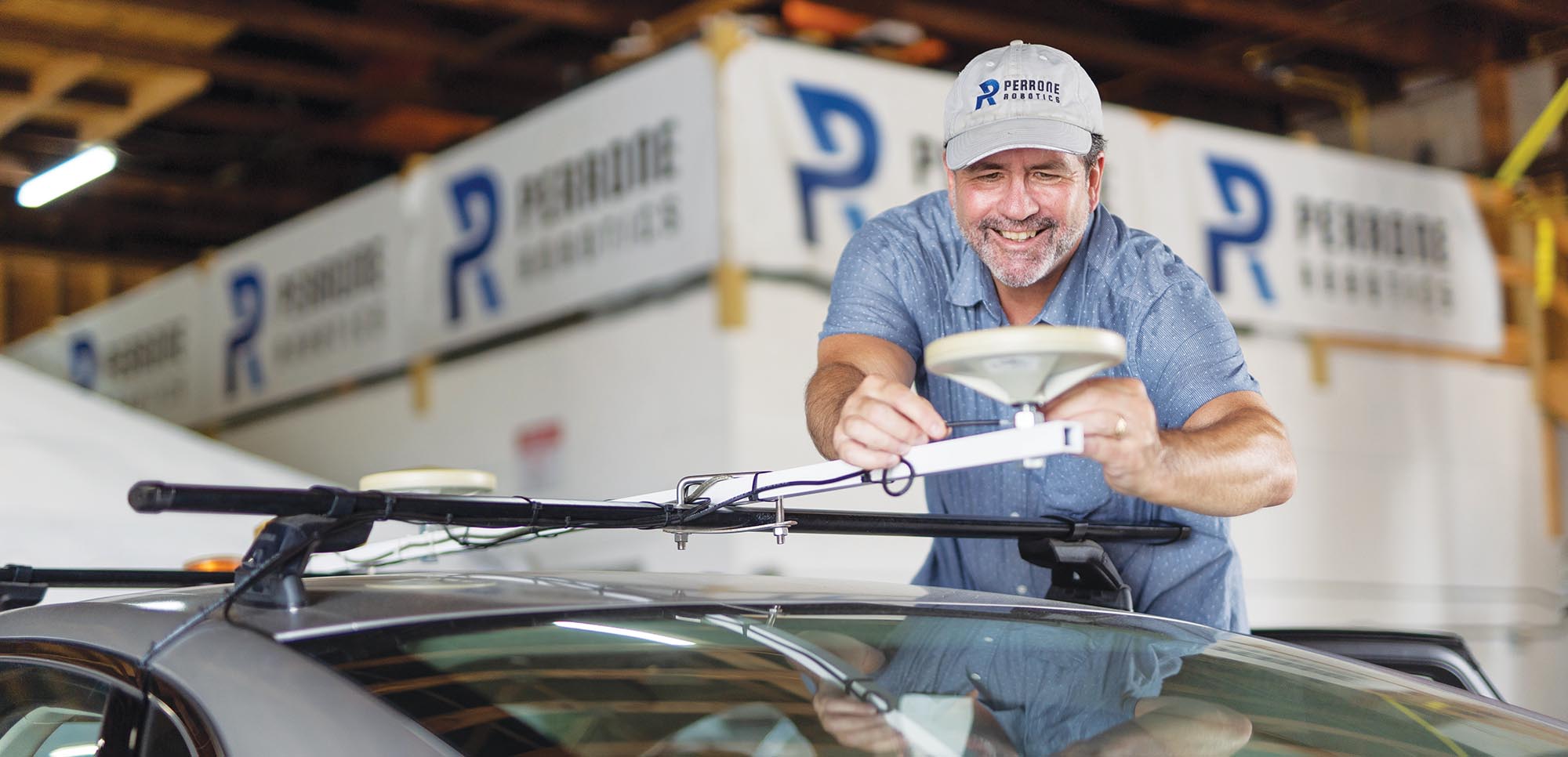Perrone Robotics Powers Innovation in Virginia
Pushing Boundaries in Autonomous Vehicles Industry
Perrone Robotics, Inc. has been refining and manufacturing its autonomous car software at its Albemarle County headquarters and test track since 2003. In addition to its turnkey solutions kits, which allow existing vehicles to be retrofitted as autonomous vehicles, the company provides services ranging from last-mile shuttles to logistics and work site operations.
Perrone’s To Navigate You (TONY®) system is currently in use on an Americans With Disabilities Act-compliant, full-size, zero-emissions electric passenger van called the AV Star, developed by Perrone and Canada-based GreenPower Motor Company. One of the vans is currently in testing in Jacksonville, Fla., where the Jacksonville Transit Authority is aiming to deploy a fleet of AVs by 2023.
Perrone and Arizona-based Local Motors Inc., the world's leader in shared electric autonomous shuttles, signed an original equipment manufacturer agreement in August 2021 to develop next-generation autonomous shuttles that will integrate Perrone's autonomous vehicle technology into Olli, the low-speed, driverless shuttle designed and manufactured by Local Motors and intended for transporting people around city centers, campuses, and neighborhoods.
Emerging as a leading innovator in the autonomous vehicles industry, Perrone Robotics has continued to grow its Virginia operation despite competition from other states. A 2017 expansion of its research and development operation prompted the company to consider California, Michigan, and Pennsylvania for the project, with Virginia ultimately standing out due to its industry advantages, high-tech talent, and renowned livability.
The Virginia Solution
Commitment to Unmanned Innovation
Perrone benefits from its location in a state that embraces emerging technologies. Virginia’s R&D assets, top-ranked education system, varied geography for testing, and proximity to Washington, D.C. and major defense contractors set the foundation for success for companies in the unmanned systems industry. The Commonwealth’s history in this sector dates back to 1924, when Lt. John Ballentine and electrical engineer Carlo Mirick completed the world’s first unmanned radio-controlled flight at the U.S. Navy facility that would become the United States Naval Surface Warfare Center Dahlgren Division.
Since then, Virginia has hosted the first FAA-approved drone delivery (Wise County, 2015) and the country’s first commercial drone delivery service (Christiansburg, 2019) and become the first state to allow unmanned personal delivery devices to operate on sidewalks, shared-use paths, and crosswalks. In 2019, during a successful three-month open-road trial in the company’s hometown of Crozet, Perrone’s Autonomous Vehicle, Neighborhood Use, or AVNU, became the first fully autonomous shuttle to operate on public streets in Virginia.
The Commonwealth continues to invest in research surrounding autonomous vehicles and disruptive automotive technology. Virginia ranks 10th nationwide and third in the Southeast in research spending in areas relevant to automotive manufacturing. In 2019, Virginia’s public universities invested more than $400 million in automotive research.
The Virginia Tech Transportation Institute (VTTI), the second-largest university-level transportation institute in the country, offers a number of unique infrastructure-related programs helping to define the technological innovations of tomorrow in the transportation industry. VTTI administers the Virginia Automated Corridors, which allow manufacturers to test automated vehicle systems in real-world operating environments, including 70 miles of interstates and arterial roads in the highly populated Northern Virginia region, as well as two closed roadway facilities (Virginia Smart Road in Montgomery County and VIRginia International Raceway in Halifax County).
Entrepreneurial Environment and Quality of Life Drive Investment
Central Virginia is a vibrant economic ecosystem powered by the vision and passion of entrepreneurs, the strength of top-ranked University of Virginia (UVA), and an exceptionally skilled and educated workforce. The region has long been known for its scenery and livability, offering theater, music, vineyards, craft breweries, historic sites, whitewater rafting, kayaking, rappelling, and hiking in the Blue Ridge Mountains.
Paul Perrone, the company’s founder and CEO, fell in love with Central Virginia as a student at UVA, saying the area offers “a perfect blend of high-tech energy and a cultured university town with arts, high quality of living, and natural beauty that is unmatched in the U.S.”
These unique assets help attract and retain top talent, including recent graduates who decide to stay in the region. Albemarle County was a natural choice for Perrone’s headquarters and prompted the company to again select Virginia for the $3.8 million expansion of its research and development operation after a national search in 2017. VEDP supported the project’s creation of 127 new jobs through the state-funded Virginia Jobs Investment Program (VJIP), which provides consultative services and funding to companies creating new jobs to support employee recruitment and training activities. As a business incentive supporting economic development, VJIP reduces the human resource costs of new and expanding companies.
Nearly a century after the unmanned systems industry first took off from a Virginia runway, the Commonwealth is at the forefront of cutting-edge technologies and offers an environment that fosters the growth of innovators like Perrone Robotics.
